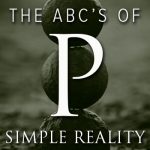 We loved Jesus, Socrates and Gandhi—after we murdered them.
We loved Jesus, Socrates and Gandhi—after we murdered them.
While they were alive, they were a tremendous pain in the ass.
— Robert Kegan
Humanity from the beginning of our story has ignored its prophets and returned to the self-destructive distractions of its survival strategy or twisted the meaning of the message to fit the purposes of the false self. These missed opportunities are a tragic and ironic testimonial to the intensity of our fear of facing the reality of the suffering identified in Buddha’s First Noble Truth. Like all the great dragons of our fear-filled narrative, once we turn to face them they melt into the mists of illusion.
“But in addition to truth telling, the prophets had a second task. They held up an alternative vision, they helped the people to imagine new possibilities.”[i] We are in need of prophets today to envision life in the “new world” of Simple Reality. the Old Testament prophet Amos provides us with the model as we imagine what a prophet of the 21st century might say.
As we would expect he attacks the fear-driven false-self behaviors, warns of the coming consequences of the unsustainable paradigm and offers an alternative, healthier future. “Having left his herds to see Beth-El, he was horrified at the unnatural complexity of the life which he discovered there, the inequality of fortune, the bitterness of competition, the ruthlessness of exploitation. So he ‘stood at the gate,’ and lashed the consciousless rich and their luxuries.”[ii]
His words have found their way into Martin Luther King Jr.’s ringing speeches: “Let judgment run down as waters, and righteousness as a mighty stream.”[iii] Notice how Amos sees the need for simplicity lamenting the “unnatural complexity” of life in the city.
Although Amos puts a multitude of threats into the mouth of Yahveh, he also stresses the need for compassion: “For the first time in the literature of Asia, the social conscience takes definite form, and pours into religion a content that lifts it from ceremony and flattery to a whip of morals and a call to nobility. With Amos begins the gospel of Jesus Christ.”[iv] The term “messiah,” from the Aramaic m’shekha, means “the perfected form of humanity.”
Amos and Isaiah after him were advocates of Oneness and called for the end of tribal conflicts. “They offered to the unfortunate of the earth a vision of brotherhood that became the precious and unforgotten heritage of many generations [and] even if that should be a delusion it is the failing of a noble mind.”[v] It is, of course, no delusion and lies within reach of those of us who have the heart of a prophet.
It is the prophet called First Isaiah who begins to see the possibilities of Simple Reality and the coming of a new narrative. “[This] greatest of Prophets announced his mission—no longer to curse the people for their sins, but to bring them hope in their bondage. ‘The Spirit of the Lord is upon me; because the Lord hath anointed me to preach good tidings unto the meek; he hath sent me to bind up the broken-hearted, to proclaim liberty to the captives, and the opening of the prison to them that are bound.’ For he has discovered that Yahveh is not a god of war and vengeance, but a loving father; the discovery fills him with happiness, and inspires him to magnificent songs. ‘Every valley shall be exalted, and every mountain and hill shall be made low; and the crooked shall be made straight, and the rough places plain.’”[vi] This is clearly a prophet who knew how to attain an experience of the present moment.
We generally think of a prophet as one who is divinely inspired or inspired by the inner wisdom of the present moment. But we all have the voice of the prophet within us, waiting for the moment when it is given the opportunity to express a vision of humanity free from fear.
[i] Johnson, Charles. “The King We Need.” Shambhala Sun. Boulder, Colorado, January 2005, p. 53.
[ii] Durant, Will. Our Oriental Heritage. New York: Simon and Schuster, 1954, p. 316.
[iii] Ibid.
[iv] Ibid., pp. 316-317.
[v] Ibid., p. 320.
[vi] Ibid., pp. 325-326.


